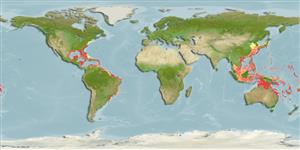Environment: milieu / climate zone / depth range / distribution range
Οικολογία
Θαλασσινό(ά) Υφαλόφιλο(α); εύρος βάθους 1 - 110 m (Ref. 26938), usually 10 - 50 m (Ref. 5217). Tropical; 41°N - 33°S
Western Atlantic: Canada (Ref. 5951) to New York (USA), Bermuda, and northern Gulf of Mexico to southern Brazil.
Μέγεθος / Βάρος / Age
Maturity: Lm ? range ? - ? cm
Max length : 18.0 cm TL αρσενικό/απροσδιόριστο; (Ref. 26340); common length : 12.0 cm TL αρσενικό/απροσδιόριστο; (Ref. 5217)
Ραχιαίες άκανθες (συνολικά): 0; Μαλακές ραχιαίες ακτίνες (συνολικά): 76-91; Εδρικές άκανθες 0; Μαλακές εδρικές ακτίνες: 58 - 69. Light tan to light gray with irregular pale rings or rosettes, some of which are dark-edged; scattered small dark spots and three large blackish spots along straight portion of lateral line, the middle one the best defined (Ref. 13442).
Inhabits sandy areas with coral rubble or seagrasses, usually near patch reefs (Ref. 9710). Shallow coastal waters to depths of 110 m (Ref. 26938). Lies motionless on the bottom, moving only when frightened (Ref. 9710). Larvae are attracted to lights at night but are difficult to see because they are transparent (Ref. 26938). About one-third of the diet consists of fishes; the rest of its food is crustaceans: crabs, shrimps, amphipods, and mantis shrimps (Ref. 13442).
Life cycle and mating behavior
Γεννητική Ωρίμανση | Αναπαραγωγή | Γεννοβολία | Αβγά | Γονιμότητα | Προνύμφες
Robins, C.R. and G.C. Ray, 1986. A field guide to Atlantic coast fishes of North America. Houghton Mifflin Company, Boston, U.S.A. 354 p. (Ref. 7251)
IUCN Red List Status (Ref. 130435)
Threat to humans
Harmless
Human uses
αλιεία: περιορισμένης εμπορικότητας; Ενυδρείο: Εμπορικό(ά)
Περισσότερες πληροφορίες
Κοινά ονόματαΣυνώνυμαΜεταβολισμόςΘηρευτέςΟικοτοξικολογίαΑναπαραγωγήΓεννητική ΩρίμανσηΓεννοβολίαΣυναθροίσεις γεννοβολίαςΓονιμότηταΑβγάEgg development
ΑναφορέςΥδατοκαλλιέργειεςΠροφίλ υδατοκαλλιέργειαςΣτελέχοιΓενετικήElectrophoresesΚληρονομικότηταΑσθένειεςΜεταποίησηNutrientsMass conversion
Εργαλεία
Special reports
Download XML
Διαδικτυακές πηγές
Estimates based on models
Preferred temperature (Ref.
123201): 21.8 - 28.9, mean 27.3 °C (based on 1916 cells).
Phylogenetic diversity index (Ref.
82804): PD
50 = 0.5000 [Uniqueness, from 0.5 = low to 2.0 = high].
Bayesian length-weight: a=0.00912 (0.00489 - 0.01700), b=3.06 (2.90 - 3.22), in cm total length, based on LWR estimates for this species & Genus-body shape (Ref.
93245).
Τροφικό Επίπεδο (Ref.
69278): 3.8 ±0.4 se; based on diet studies.
Ελαστικότητα (Ref.
120179): Μεσαίο(α), ελάχιστος χρόνος για διπλασιασμό πληθυσμού 1,4 - 4,4 έτη (Preliminary K or Fecundity.).
Fishing Vulnerability (Ref.
59153): Low vulnerability (10 of 100).
Nutrients (Ref.
124155): Calcium = 69.1 [27.1, 143.8] mg/100g; Iron = 0.55 [0.25, 0.99] mg/100g; Protein = 18.2 [16.6, 19.7] %; Omega3 = 0.0959 [, ] g/100g; Selenium = 31.4 [15.8, 67.5] μg/100g; VitaminA = 93 [24, 391] μg/100g; Zinc = 1.11 [0.73, 1.64] mg/100g (wet weight);
